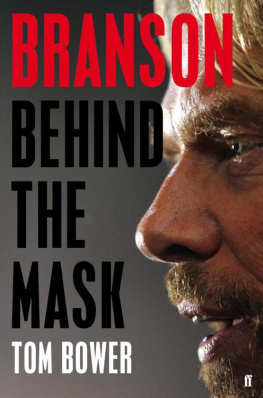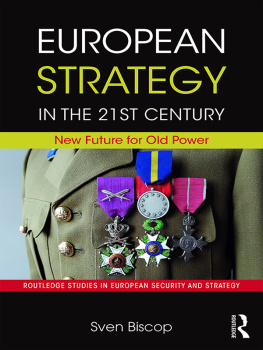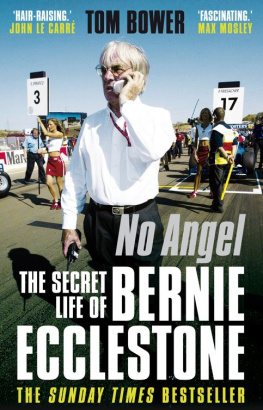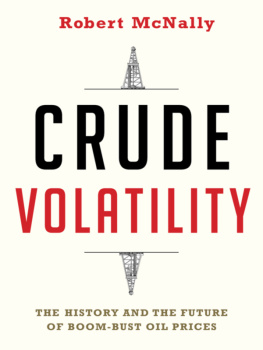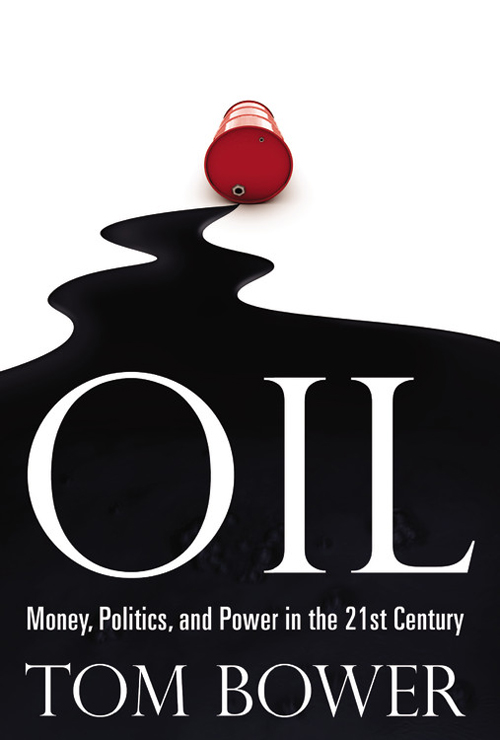Copyright 2009 by Tom Bower
All rights reserved. Except as permitted under the U.S. Copyright Act of 1976, no part of this publication may be reproduced, distributed, or transmitted in any form or by any means, or stored in a database or retrieval system, without the prior written permission of the publisher.
Grand Central Publishing
Hachette Book Group
237 Park Avenue
New York, NY 10017
Visit our website at www.HachetteBookGroup.com.
www.twitter.com/grandcentralpub.
First eBook Edition: June 2010
Grand Central Publishing is a division of Hachette Book Group, Inc.
The Grand Central Publishing name and logo is a trademark of Hachette Book Group, Inc.
ISBN: 978-0-446-56354-3
Blind Eye to Murder: The Pledge Betrayed
Klaus Barbie: Butcher of Lyon
The Paperclip Conspiracy
Maxwell: The Outsider
Red Web
Tiny Rowland: A Rebel Tycoon
Heroes of World War II
The Perfect English Spy: Sir Dick White
Maxwell: The Final Verdict
Nazi Gold
Branson
The Paymaster: Geoffrey Robinson, Maxwell and New Labour
Fayed: The Unauthorized Biography
Broken Dreams: Vanity, Greed and the Souring of British Football
Gordon Brown
Outrageous Fortune
To George and Sylvia Bower

(Press Association Images)
(AP/Press Association Images)
(AP/Press Association Images)
(Sipa Press/Rex Features)
(AP/Press Association Images)
( Tim Lambon/Greenpeace)
(Photograph by Jim Berry, Camera Press London)
(Photo by David Skinner)
(Press Association Images)
(AP/Press Association Images)
(Tass/Press Association Images)
(AP/Press Association Images)
(AP/Press Association Images)
(AP/Press Association Images)
(AP/Press Association Images)
(AP/Press Association Images)
(Tass/Press Association Images)
(AP/Press Association Images)
(Nicholas Richer/PatrickMcMullan.com)
(Roberto Arcari/contrasto/eyevine)
(AFP/Getty Images)
(epa/Robert Vos)
(AP/Press Association Images)
(Reuters/Itar Tass)
( Igor Gavrilov/Greenpeace)
(Reuters/Mark Wilson)
(AP/Press Association Images)
(Yuri Kadobnov/AFP/Getty Images)
(Press Association Images)
(AP/Press Association Images)
(Reuters/STR New)
(LANDOV/Press Association Images)

V IENNA , M AY 28, 2009
D ESPITE THE CROWDS of journalists and TV cameras jostling in the small entrance hall of OPECs Vienna headquarters, the atmosphere was mellow. After the frenzy of oil prices soaring and then crashing during 2008, the arrival of Ali al-Naimi, the dapper Saudi oil minister, seemed undramatic. The small man was smiling after his 20-minute walk from the Grand Hotel, but his serenity was deceptive. Known as Mr. OPEC, or the leader of the Organization of Petroleum Exporting Countries, al-Naimi had uncharacteristically sought publicity before the 11 members of the price-fixing cartel began their 153rd meeting that morning.
We think prices will rise, he had puffed during a 6 a.m. run along the Baroque Ringstrasse the previous day. As usual, he was seeking to influence the markets in New York and London. To his satisfaction, over the next 24 hours speculators had bid up oil prices by $1 to $63 a barrel, a 100 percent increase in eight months. Over the next weeks, al-Naimi hoped, if the speculators could be persuaded, prices would rise by another $20; more truculent OPEC members, he knew, would hope that prices would eventually rise by a further $70 to $150, an all-time high. Billions of dollars had flowed from the Western countries into the oil producers coffers in previous years, but al-Naimi was determined to defy economic law. Demand for oil had fallen since the crash in July 2008, record amounts of oil were in storage, and the world had plunged into recession. Yet he was talking up prices. Of course he understood that an excessive price hike would endanger the worlds economy and annoy Saudi Arabias allies in Washington but a limited increase would benefit his interests. If he was to succeed, he would have to persuade the other OPEC members, an exclusive but quarrelsome club, to endorse his strategy.
Unlike the exotic pageant of presidents and kings who had attended OPECs meetings during the 1970s, the 10 ministers and their aides who followed al-Naimi into the shiny office block were colorless placemen. Journalists no longer witnessed dramas like Saddam Hussein embracing his bitter enemy the Shah of Iran in 1975 while the stylish Sheikh Yamani, al-Naimis predecessor as the Saudi oil minister, hovered in the background. In those days, the dictators posed as brokers of the worlds future. Having wrested control of their oil from the cabal of dominant Western companies known as the Seven Sisters, the OPEC countries had freed themselves of the imperialist, and occasionally racist, attitudes that had formerly dictated their fates. The American and British corporations, blamed for their willful blindness about realities in West Africa, Central America and the Arab world, had ceased to be the guardians of the common destiny.
Nevertheless, oil remained the worlds biggest business. Every aspect of mankinds lives depended on the refinement of crude oil into energy, plastics, chemicals and drugs. For a century the commodity has been on a roller coaster, swinging from surplus to shortage. Cheap oil has fueled booms while high prices have plunged the world into recession. Finding a balance has been elusive. Always the target of mistrust, oil has now become a tougher, more unpredictable business than ever before.
In 1975 Anthony Sampson, the redoubtable author of The Seven Sisters, a groundbreaking description of the relationship between the seven major oil companies and OPEC, described the ArabIsraeli war of 1973 as the last battle to control the industry. The fascination of oil history, he wrote, lies in the ever changing form of the battle to control supply. Focused on the collision course between the governments of the oil producers, the oil companies and the governments in Washington and London, Sampson, like others, did not anticipate Iraq waging war against neighboring Iran and Kuwait, or that America would twice lead invasions of Iraq, characterized by some as blood for oil. He would have been struck, as I was, by the candor of the vice president of one of Americas biggest oil companies whom I asked in passing in 2007, Was George W. Bushs invasion of Iraq about oil? He replied, Absolutely, yes. Some argue that the ideological Cold War has been replaced by resource wars. In Sampsons era, the resource war revolved around disputes about prices between the oil companies and OPEC.
In the two years after the 1973 ArabIsraeli war, the OPEC leaders defied American forecasts that their cartel would collapse, because the consequence of oil prices quadrupling would be a recession in the West. But OPECs defiance was rewarded, and despite the nationalization of many Western-owned oilfields, the unnerved oil companies collaborated with their expropriators. Stripped of their mystique and their arrogance, the American and British giants were transformed into paper tigers. Anxious to guarantee oil supplies and to maintain their share of markets, the companies that had discovered and developed the oilfields and refined the crude became supplicants. To many, OPECs ascendancy appeared to be irreversible. Only a few wise oilmen mentioned the fact that cycles never changed. Permanently fixing the market was beyond any mortal, even the OPEC nations.







